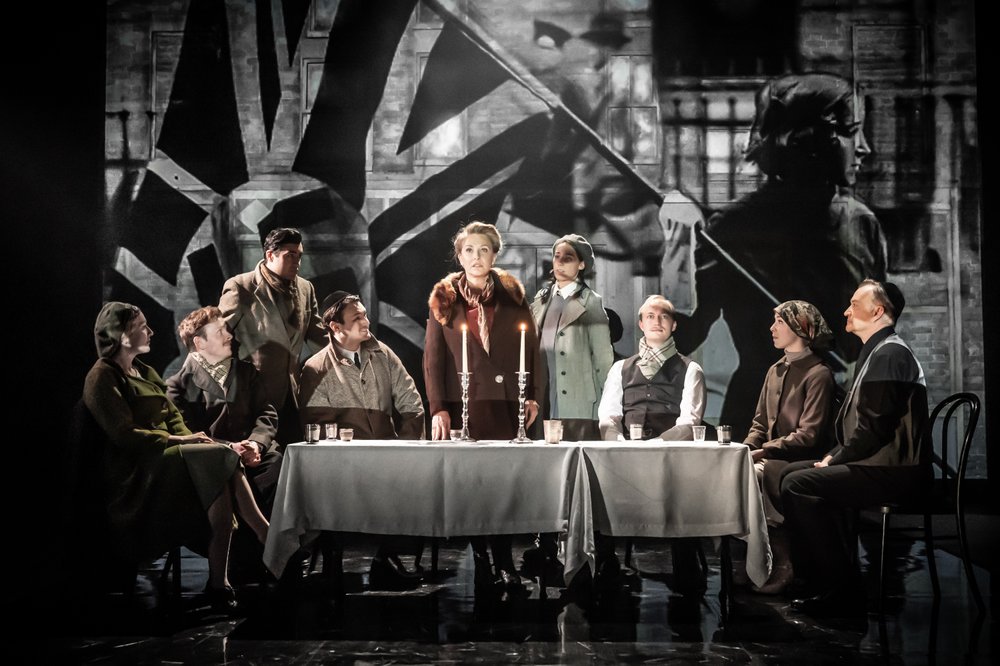
Written by William Shakespeare
Adapted by Brigid Larmour from an idea by Tracy-Ann Oberman
Directed by Brigid Larmour
A Co-production by Watford Palace Theatre and HOME Manchester
HOME
This new adaptation of Shakespeare’s “problem play” sees actress and writer, Tracy-Ann Oberman and director Brigid Larmour rework The Merchant of Venice for a female Shylock who is a widow and a mother. This female money lender is based on Annie, the great-grandmother of Oberman and all those strong women who emigrated to Britain after the 1905 progroms in Russia. Tracy-Ann Oberman embraces the discomfort of this role as the beleaguered moneylender demanding her pound of flesh, giving a strong impassioned performance in this still widely debated play that questions Shakespeare and his views on Judaism.

The sound of shattering glass offstage indicates that the brewing antisemitism of Thirties Europe is alive and flourishing in the East End of London.This production is set in 1936 to the backdrop of the rise of Oswald Mosley and his British Union of Fascists party and the resulting riots during The Battle of Cable Street on 4th October 1936 when working class people came together in support of the Jewish community. The deeply divisive aspects of this play are further highlighted by the fact that it was also adopted by the Nazi regime in Germany where the characterisation of Shylock was used to validate antisemitism. After Kristallnacht The Merchant of Venice was performed all across Germany.
Here Larmour and Oberman do not shy away from the complexity of their Shylock but balance it neatly against a background of privilege and arrogance as the Venetian noblemen became rather less noble as entitled Bullingdon Boys in the vein of Boris Johnson, David Cameron and George Osborne caricatures. Their Portia is a cool willowy blonde society heiress equally at home in riding jodhpurs or a bias cut ivory satin evening dress. Clearly modelled on the infamous Diana Mitford, wife of Oswald Mosley who married him at the home of Joseph Goebbels, this is a woman giddy and lethal in her own sense of power.

The set design and costumes by Liz Cooke work together wonderfully well to capture the gritty side of East End London and the sleek sophistication of society life. Everything about this production suggests a real love for the project and great attention to detail. The music of the period blends Yiddish music and classics such as the apt Stormy Weather. The screen images tell a story of the rise of Fascism and quiet poignant moments on stage such as a disparaging glance between Portia and Jessica say more than words ever could about a society where old money and breeding will always sneer at new money.
This is a strong cast with well balanced performances but ultimately it is the women who shine most brightly. As Portia, a pitch perfect Hannah Moorish hands out money and a ring to Brassanio, her new husband and Shylock finances the Merchant Antonio with her bond; it’s notable that these very different women are also moneylenders exacting and expecting their own pound of flesh. Tracy-Ann Oberman relishes a role that celebrates women she clearly feels incredibly proud off. Her call to arms in the closing sequence is a plea that we are better together…perhaps the placing of some of the audience on stage is also a powerful unifier. In difficult times we all have to make choices where we stand…if we do not then those choices can be ripped away. The most powerful moment in the production is not Oberman onstage but sitting on the rough wooden step. Momentarily beaten by the bullying elite, she is clutching a tiny brown suitcase just like all those still stacked together as a memorial to all those sent to camps such as Auschwitz.